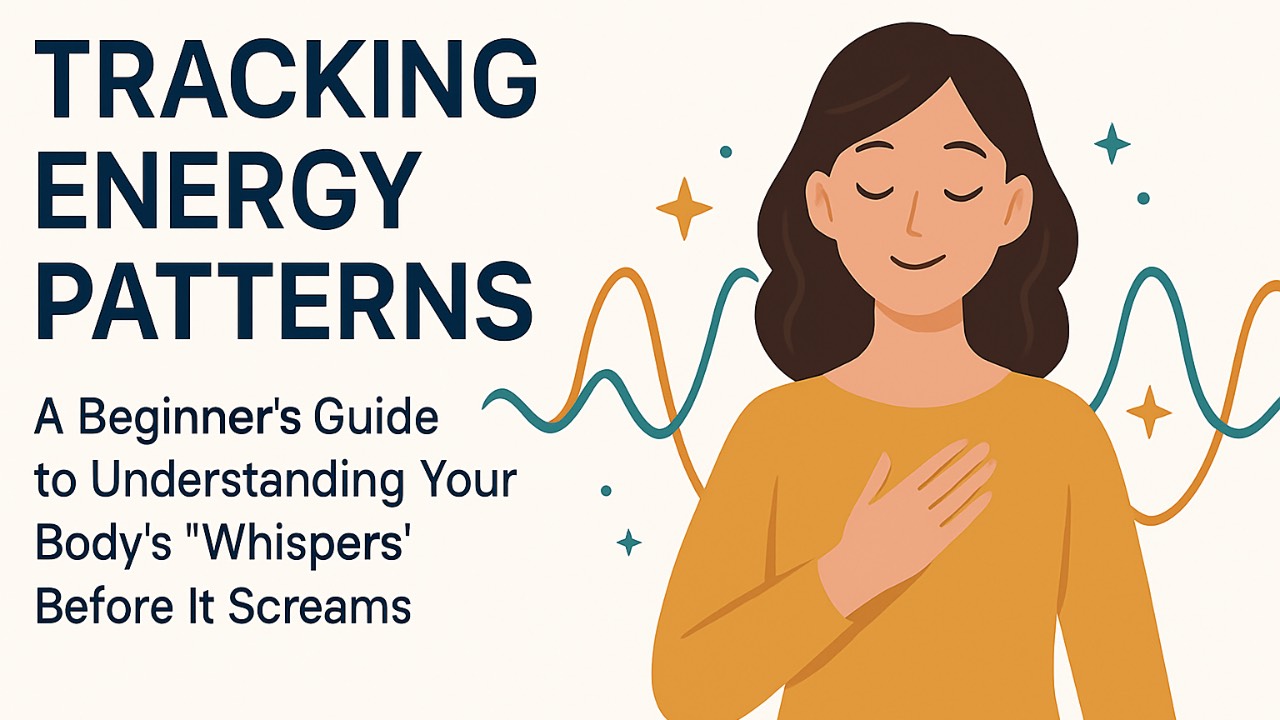Tracking Energy Patterns: A Beginner’s Guide to Understanding Your Body’s “Whispers”
Apr 26, 2025
You know those days when you wake up already tired?
Or the mornings when everything feels fine until you eat—and then, suddenly, it doesn’t?
Maybe it’s subtle. A small crash after lunch. A creeping fog you blame on the weather or not enough coffee.
You push through it, of course. We all do.
It is easy to brush these shifts aside, because they are quiet at first. Barely a whisper. But sometimes, the whispers are your body’s way of warning you—long before it starts to scream. Learning to track these patterns can change everything. Not in an obsessive, minute-by-minute tracking app way.
More like noticing the subtle shifts in the wind before a storm rolls in. It is not about being hypervigilant.
It is about being a better listener.
⸻
Why Energy Tracking Matters More Than You Think
Most of us are trained to pay attention only when symptoms get loud. The migraine that forces you to cancel plans. The full-body fatigue that leaves you staring at your to-do list without a clue how to start. The anxiety that seems to come from nowhere.
But those “big” symptoms often start as much smaller signals.
A slight dip in energy after a meal.
A rush of overstimulation after a multivitamin.
A hollow, restless feeling you can’t explain after a stressful call.
Your body keeps score long before the scoreboard lights up. And once you start noticing these tiny shifts, you start seeing patterns. Patterns that can help you catch issues early, adjust faster, and avoid bigger crashes later on.
⸻
What Are You Actually Tracking?
When I first started paying attention, I thought energy was just… energy.
Either you have it, or you do not.
Turns out, it is more layered than that.
Here are a few things you might gently notice:
• Physical energy: Is your body heavy or light? Slow or responsive?
• Mental clarity: Are your thoughts sharp, cloudy, scattered?
• Emotional resilience: Are you quick to frustration? Fragile after stimulation?
• Post-meal patterns: Do you feel better, worse, or neutral after eating?
• Supplement responses: Do new vitamins energize, flatten, or overstimulate you?
It is not about judging yourself. It is about gathering quiet clues.
Like a blue tick hound who knows the crime scene tells the real story long before the headlines do.
⸻
How to Start Tracking Without Overwhelming Yourself
You do not need a spreadsheet.
You do not need five apps.
You do not even need to track every single day.
Honestly, the simplest tools work best.
Start with this:
Pick two checkpoints each day to reflect (mid-morning and mid-afternoon work well)
• Ask yourself two questions:
- How is my body feeling right now?
- What happened in the last few hours that might have influenced this?
Write down a few words. Nothing fancy.
- “Tired after smoothie.”
- “Sharp until 2 PM, crashed after lunch.”
- “Anxious after B-complex.”
Over time, the small notes start weaving into a story.
You will notice that certain meals stabilize you, while others set off a slow decline.
You will realize that you actually feel better without that new supplement everyone online said was a game changer.
You will start recognizing your own body’s cause-and-effect loops—before they spiral out of control.
⸻
Signs You Might Already Be Missing Important Whispers
Most people only realize they needed to track earlier when the signs get louder.
But looking back, the clues were often already there.
If you relate to any of these, tracking could bring big clarity:
• Feeling worse after trying new “energy” or “focus” supplements
• Afternoon crashes that feel like someone flipped your brain’s off switch
• Needing multiple stimulants (coffee, matcha, nootropics) to stay afloat
• Emotional reactivity that seems out of proportion to the situation
• Fluctuating appetite, digestion, or sensitivity to light and sound
These are not failures.
They are friction points.
Your body trying to tell you, “Something is off here.”
In a whisper. At first.
⸻
What You Might Learn (That Lab Work Alone Cannot Show You)
I am all for good lab work.
But there are things no blood test can fully capture—because your genes, your nervous system, and your lived experience move in real time.
Tracking energy patterns can help you realize things like:
• You feel wired but tired after high-protein breakfasts (hinting at COMT clearance issues)
• You crash harder on days when you eat leftovers or wine (hinting at histamine sensitivity)
• You are more emotionally fragile after stacking B vitamins (hinting at methylation bottlenecks)
This is the kind of information that gives you real leverage.
It is not about diagnosing yourself.
It is about understanding your system so you can support it on its own terms.
⸻
Final Thoughts: Start Small. Stay Curious.
The goal is not to catch every blip in your body.
It is not to turn health into a full-time job.
It is to build a relationship with your own signals.
To hear the quiet sighs of your nervous system before they turn into alarms.
To notice when a supplement, a meal, or a stressor nudges you off course—so you can course-correct with kindness instead of panic.
And maybe, over time, to trust your body’s whispers enough that you do not have to wait for it to scream.
⸻
Want a Simple Tracker to Get Started?
I created a printable Energy Pattern Self-Tracker you can use to gently spot your body’s shifts without overwhelm.
You can download it for free - Energy Whisper Tracker
Just two notes a day. That is it.
It is enough to start seeing the real story your body is already trying to tell you.


